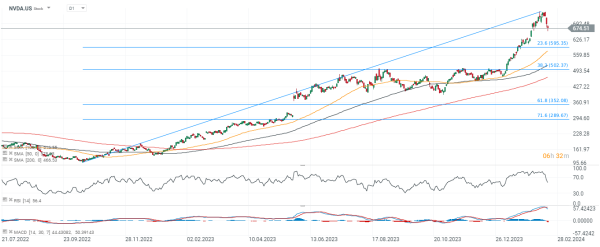Nvidia results beat Wall Street estimates 📈 Shares gains 5% after-market
Nvidia (NVDA.US) results were the most important report for Wall Street for weeks. The Q4 results beat market expectations on both revenues and EPS. Nvidia shares gains nearly 7% after the US market close, leading to the surge in other tech companies valuations. Nvidia's CEO Jensen Huang called generative AI a 'tipping point' which means that the company sees AI as a really disruptive technology, and what's more its financial results justified this view.
- Revenue (Q4 2023): $22.1 billion vs. $20.41 billion exp. (265% YoY and 22% sequentially)
- Earnings per share (Non-GAAP): $5.16 ($4.93 GAAP) vs. $4.63 exp.
- Data center revenue: $18.48 billion vs. $17.21 billion exp. (409% YoY)
- Gaming revenue: $2.98 billion vs. $2.72 billion exp. (59% YoY)
- Automotive revenue: $281 million vs $272.1 million exp. (-4.04% YoY)
- Professional Visualization revenue $463M vs $435.5 million exp.(11% YoY)
- Gross margin: 76.7% vs. 75.4% forecasts (66.1% in Q4 2022)
Nvidia estimates Q1 revenue at $24.8 billion (with 2% deviation tolerance) vs $21.9 billion Wall Street forecasts. The company informed that it bought $9.2 billion in its own stock shares. CEO, Huang told investors that demand is surging worldwide across "companies, industries and nations", According to him "the 2024 will bring major new product cycles with exceptional innovations to help propel our industry forward". Investors appreciate Huang's optimism about AI 'sea change' and today report signals huge improvement in Nvidia business, with almost 800% rise in free cash flow on YoY basis. Nvidia informed today that the company collaborates as a launch partner with Google in delivering Gamma (optimized series of models giving users the ability to develop with LLM, using a desktop RTX GPUs.
Facts from report
- Data Center revenue for the fourth quarter was a record, up 409% YoY (27% sequentially)
- Gaming revenue was up 56% YoY, signalling a major improvement (but flat sequentially)
- Automotive revenue was down 4% from a year ago and (8% sequentially)
- Professional Visualization revenue was up 105% YoY (11% sequentially)
- Free cash flow: $11.22 billion vs $10.82 billion ($1.74 billion in Q4 2022)
- Operating expenses: $2.21 billion vs $2.23 billion (25% y/y)
- R&D expenses:$2.47 billion, vs $$2.43 billion exp.
Data Center computing revenue as for Q4 2023 was up 488% from a year ago and 27% QoQ; it was up 244% in the fiscal year. Revenue in networking was up 217% from a year ago and 28% QoQ in Q4 (and 133% in the 2023 year). The surge in data center sales reflect higher shipments of the NVIDIA Hopper GPU computing platform used for the training and inference of large language models and generative AI applications, etc. Large cloud providers represented more than half of Nvidia's date centers revenue. Strong demand was driven by enterprise software, consumer internet applications, and multiple industry verticals including automotive, financial services, and healthcare. Data Center sales to China declined significantly in the fourth quarter (U.S. licensing requirements). Nvidia told that gross margins in the fourth quarter also benefited from favorable component costs.
Outlook for the Q1 2024
- Gross margins are expected to be 76.3% and 77.0%, respectively, plus or minus 50 basis points.
- Expenses are expected to be approximately $3.5 billion
- Other income and expense are expected to be an income of approximately $250 million, excluding gains and losses from non-affiliated investments.
- Tax rates are expected to be 17.0%, plus or minus 1%, excluding any discrete items.
Commentary
The report came in very strong, signalling huge AI investment momentum and demand for AI chips (data centers). Investors have another 'hard proof' that AI demand is real, and the revolution may be not even close to start. However, it's also worth noting that the company has a huge market cap (more than $1.6 trillion), and it's hard to expect shares to grow 100% in each subsequent year. Outstanding 2023 year was breaking point for a whole Nvidia's business but if investors will be too optimistic in guidance to next quarters, there is still a place for disappointment but... For now, it seems like Wall Street underestimate the power of AI more than is too optimistic about it. As for now, we see quite few companies which can really gain money and produce free cash flow due to AI demand - the risk is not in AI as a technology, but in valuations because 'too much money enter too few goods' may lead to unhealthy, speculative rally in the long term.
 Source: xStation5
Source: xStation5